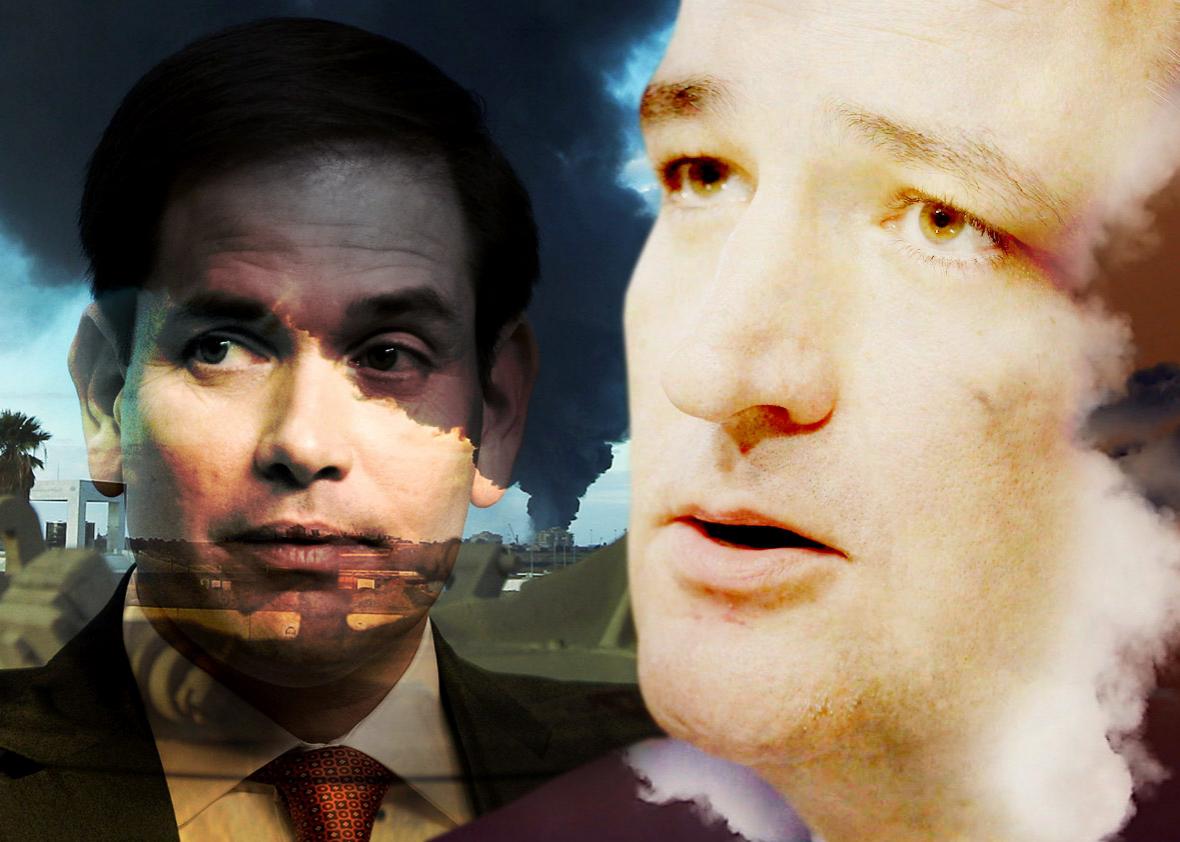Sens. Ted Cruz and Marco Rubio, the shadow front-runners for the Republican nomination, have spent the last several weeks previewing the barbs they’ll use against each other should they eventually assume the top two polling positions, as expected. Cruz says Rubio’s soft on immigration. Rubio says Cruz is soft on surveillance. They disagree on the best approach to slashing taxes for the wealthy.
On Monday, Cruz sharpened a new line against Rubio: that the Florida senator is a reckless nation-builder and an advocate of “military adventurism,” right up there with the treacherous Hillary Clinton. It’s less of a pivot from Cruz than an elevation of the foreign policy subtext he’s been prepping all along. And it’s a twofer, because he could conceivably use it against Rubio in the primary and then against Clinton in a hypothetical general election faceoff. For the purpose of winning this election, Cruz has crafted himself as the middleman between Sen. Rand Paul’s least interventionist foreign policy—which is unacceptable in a Republican primary—and the neoconservatives’ omnidirectional interventionism—which is politically dangerous in a general election.
Whatever brew of conviction and political opportunity brought Cruz here, it has the potential to serve as a breakthrough for the Republican Party. The GOP has wasted years on a misguided quest to find out what Clinton was eating or drinking at 2 a.m. the night of the Benghazi attack, which came more than a year after the Clinton-backed Libya intervention itself. Now Cruz, a top candidate trusted by conservatives, can lead the party onto the more solid-footed critique of Clinton’s role in the 2011 Libya intervention, which has yet to produce much beyond Moammar Gadhafi’s death and chaos in that country. This should have been the approach of the party the whole time, rather than obsessively going down one conspiracy theory rabbit hole after another on Benghazi. It’s now the tack Cruz will take against his likely principal GOP primary rival.
“Senator Rubio emphatically supported Hillary Clinton in toppling Qaddafi in Libya,” Cruz said in an interview with Bloomberg Politics on Monday. “I think that made no sense.” Unlike some others who have opposed the Libya intervention but hedged on alternatives, Cruz forthrightly said that the United States had an interest in keeping Qaddafi in power. “Qaddafi was a bad man, he had a horrible human rights record,” he said. “And yet … he had become a significant ally in fighting radical Islamic terrorism.” Cruz went on to make the more obvious, big-picture analysis of the Benghazi attack—“The terrorist attack that occurred in Benghazi was a direct result of that massive foreign policy blunder”—before more creatively lumping President Obama, Hillary Clinton, and neoconservatives into one hot bundle of awful foreign policy decision-making:
If you look at President Barack Obama and Hillary Clinton and for that matter some of the more aggressive Washington neo-cons, they have consistently mis-perceived the threat of radical Islamic terrorism and have advocated military adventurism that has had the effect of benefiting radical Islamic terrorists.
Clinton and Obama would dispute their similarity to the neoconservatives, and vice versa. But Cruz otherwise sounds a lot like Bernie Sanders and Martin O’Malley in their own knocks against Clinton’s foreign policy. They’ve each used these reasonable criticisms of the Libya venture to argue against the further escalation in Syria that both Clinton and Rubio recommend: the establishment of a no-fly zone. Recall that the U.N. intervention into Libya that Clinton recommended began with the establishment of a no-fly zone in order to protect Libyan rebels from an imminent attack by Gadhafi. Once that assault was thwarted, the mission crept into one of regime change, with the U.N. providing aerial bombardment in support of a westward rebel march towards Tripoli.
So: Cruz has a strong criticism of a strong primary rival’s foreign policy that doubles as a strong criticism of a strong general election rival’s foreign policy. The criticism also distances the party from George W. Bush’s legacy of recklessness. And it wrests the GOP from the counterproductive rabbit hole it had fallen into regarding Clinton’s actions during the Benghazi attack, while installing in its place a meatier breakdown of the flaws in her doctrine.
Sounds good. But then why, if this works on so many levels, hasn’t another Republican candidate—aside from Paul, who’s too far outside the Republican foreign policy mainstream for him to work it persuasively within his party—run with it?
Well, there’s a reason that Republicans became hung up on Benghazi distractions instead of going after the bigger mess in Libya as a means of tarring Clinton in the first place: because a lot of them both supported the Libyan intervention and more broadly support most intervention. The Republican foreign policy establishment is comprised of hawks, and Republican foreign policy right now is defined by opposition to President Obama’s perceived lack of hawkishness. The one time that Obama (prodded on by Clinton) did carry out a policy of U.S. military–backed regime change, the country devolved into a chaotic breeding ground for terrorism. You may recall that a similar situation developed following the previous episode of U.S. military–backed regime change. Hawks would prefer not to talk in much depth about either of these. And so we read Sidney Blumenthal’s emails to Hillary Clinton instead.
Cruz is positioning his foreign policy as a “third way” between that of Paul and the hawks. At least in this instance, though, he sounds much closer to Paul. As such, he risks offending the party’s foreign policy leaders and rallying them to Rubio’s defense. But Cruz has so much credibility among conservatives that tarring him as “weak” may not be particularly effective. So it’s a smart strategy!
Ultimately, you can always, always expect Cruz to be well-prepared when the obvious counterpunch about his softness comes. And taking the opposite position of Hillary Clinton, on any issue, is always worthwhile politics in a GOP primary.
